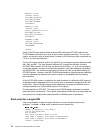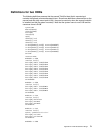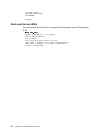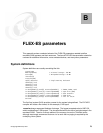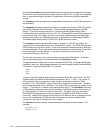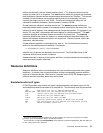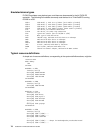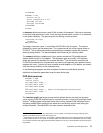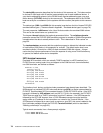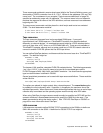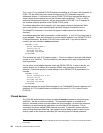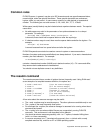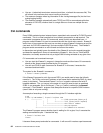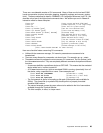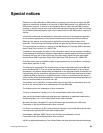78 S/390 PID: ThinkPad Enabled for S/390
The device(00) parameter describes the first device of this resource set. The index number
is decimal; it must begin with 00 and be incremented by one for each additional device. If
your device addressing scheme (at the OS/390 level) requires addressing gaps, you must
define dummy (OFFLINE) devices in the resource set. The addresses seen at the OS/390
level are set by the cu statement (in the systems definition section) that points to this resource
set.
The device type (3390-1 and 3390-3 in this example) must be from the list of known FLEX-ES
emulated device types. (These are listed in Appendix , “Emulated device types” on page 76.)
The next parameter, /s390/xxxxx, is the Linux file that contains the emulated 3390 volume.
This can be the actual name or a symbolic link.
The keyword devopt indicates that optional parameters follow. The writethroughcache
parameter causes the FLEX-ES 3390 emulation program to consider s S/390 write operation
complete when the data is actually written to disk. This is described in “Disk caches” on
page 50.
The trackcachesize= parameter tells the emulation program to allocate the indicated number
of track buffers (3390 tracks, in this example) for a cache. The default cache size is one
emulated cylinder (15 tracks for a 3390) for each emulated S/390 disk volume. A larger
cache size may improve performance, but at the expense of using more ThinkPad memory.
In general, the default cache size is acceptable.
3270 terminal resources
Emulated 3270 terminals, which are actually TN3270 sessions (or x3270 sessions) to a
FLEX-ES server running under Linux and appear to the S/390 as local, channel-attached,
non-SNA terminals, are defined as follows:
R10A3174: cu 3174
interface local(1)
device(00) 3278 mastcon
device(01) 3278 term701
device(02) 3278 term702
device(03) 3278 OFFLINE
device(04) 3278 @9.12.17.210
.....
device(15) 3278 term70F
end R10A3174
The interface, local, device, and device index parameters have already been described. The
3174 cutype is a provided FLEX-ES value and device type 3278 is a device type emulated by
FLEX-ES. Each emulated 3270 is connected through a FLEX-ES TN3270 server. If the 3278
keyword is followed by @IP-address (such as @9.12.17.210 in the example), the FLEX-ES
TN3270 server waits for a TN3270 connection from this IP address. If the 3278 keyword is
followed by the OFFLINE keyword, then a FLEX-ES mount command must be issued to
assign either an IP address for the connection or a name for the Terminal Solicitor. If the
3278 keyword is followed by a name (such as mstcon or term70F), this name is added to the
list of terminals available through the FLEX-ES Terminal Solicitor (which is described in
“Building a shell script” on page 29 .)
Typical mount commands, from a flexes prompt, might be:
flexes> mount 703 bills
flexes> mount 704 @9.12.17.211



